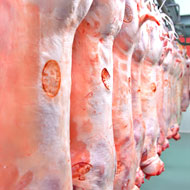BVA responds to Belgium’s decision on non-stun slaughter

"Our focus on this has nothing to do with the expression of religious beliefs but is about finding ways to reduce the welfare harm of non-stun slaughter"
BVA president John Fishwick says Belgium’s decision on non-stun slaughter shows a domestic ban within EU law would be possible.
A ban on non-stun slaughter was implemented on New Year’s Day in the Flanders region of the country. The move followed legislation passed by Belgium’s parliament in July 2017.
Similar restrictions are expected to be implemented in the Wallonia region from September.
Mr Fishwick said: “Belgium follows several other countries including Iceland, Estonia, Sweden, Switzerland and Denmark in its decision to ban the slaughter of animals without prior stunning.
“This shows that there is considerable strength of feeling on the issue and that a ban would be possible within domestic law of EU member states.”
He continued: “BVA would like to see all animals stunned before slaughter and this call has received widespread support from the veterinary profession and general public, including a petition with over 120,000 signatures. Our focus on this has nothing to do with the expression of religious beliefs but is about finding ways to reduce the welfare harm of non-stun slaughter.
“If slaughter without stunning continues to be permitted in the UK, then meat and fish from this source must be clearly labelled, to help customers make informed choices about the food that they buy and eat.”



 The Federation of Independent Veterinary Practices (FIVP) has announced a third season of its podcast, Practice Matters.
The Federation of Independent Veterinary Practices (FIVP) has announced a third season of its podcast, Practice Matters.